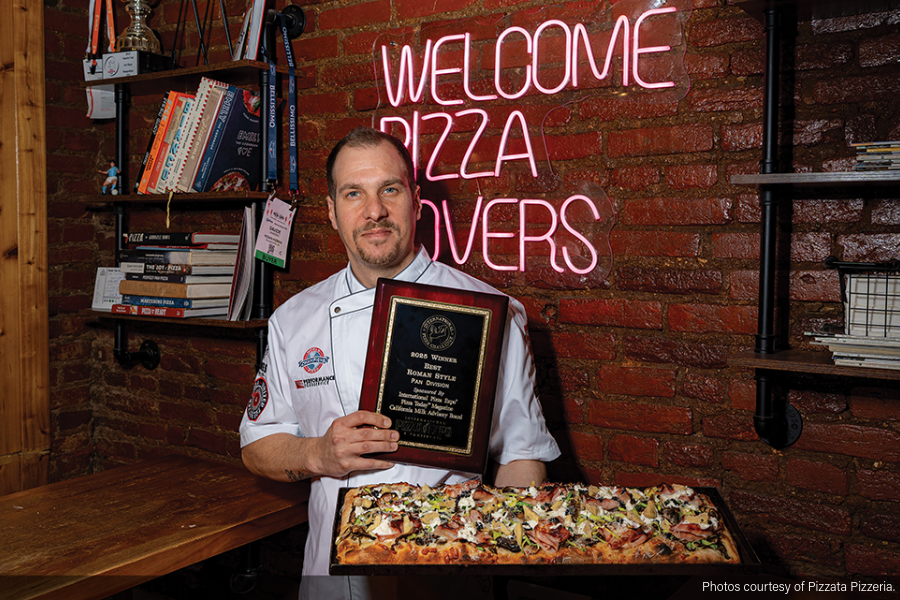Pizzeria Employee Return on Investment
Investing in your employees should be a given. After all, any investment should provide a return. Yet time and again, I’ve seen solid restaurant owners sacrifice training, assuming staff will simply “get it” or learn through on-site experience. This mentality creates a major issue: It leaves everything open to chance. Without coordinated, focused intent, everything is left to interpretation.
This inevitably leads to higher attrition, leaving the remaining staff overworked and burned out. Soon, you find yourself in a position where you can’t fire underperforming employees because you don’t have enough people. It’s a vicious cycle that turns your business into chaos. If this scenario sounds familiar, know it doesn’t have to be this way. Great restaurants thrive because their employees respect the business, understand its standards and are encouraged to grow.
Making sure new members of the team understand your pizzeria’s culture and core values are important ways to incorporate them into the team fast. Especially as you expand, the way you trained at store one – when you were there all the time – won’t work as you grow. Training needs to be standardized, and knowing these core principles will help employees return on your investment in them. Since a fully trained employee who quits represents about a $4,000 loss in today’s market, it has never been more important to ensure the investment is nurtured.
Investing in the Employee Experience
Post-pandemic, the restaurant industry’s hiring pool is drastically reduced. With so many other employment options available, only restaurants offering solid pay and a meaningful work experience can attract the best talent.
Restaurants offer food, service and ambiance. If service at your pizzeria is below par, the food and ambiance must be exponentially better to fill the gap. Even Michelin-level food can’t compensate for disinterested or disengaged service. That’s why investing in employees matters so much. Here are key rules to guide your approach:
Rule 1: Do Everything for Employees’ Benefit
When hiring, look for people with the right mindset. Skills can be taught, but attitude and disposition are harder to instill. Ask yourself: Does this candidate want to be here? Do they want to grow? If the answer is yes, you’ve got a foundation to build on.
When employees request a raise, don’t respond with skepticism. Instead, align with their goals. Say, “I absolutely want you to get a raise” and collaborate on a plan of action to help them achieve their goal. This approach fosters trust and removes roadblocks that make employees feel their growth is stifled.
Rule 2: Train the Right Way
Effective training should follow a three-part system:
- Book Training: Start with videos, PDFs and written materials to teach the basics. Have employees write answers by hand – this helps reinforce their learning.
- One-on-One Training: Pair new staffers with a trainer who observes and corrects their performance. The trainer should guide them, not perform the task themselves.
- On-Site Training: Once the trainee understands the task, let them practice it repeatedly during shifts. This builds confidence and mastery.
Rule 3: Retain Greatness
Analyze your attrition rates and aim to keep them low. Conduct quarterly reviews to provide focused feedback and host staff-development events where employees can connect on a deeper level. But don’t let these events devolve into cliquey booze fests. Instead, create opportunities for team building and collaboration.
Rule 4: Challenge and Demand More
Assume your employees want to be great. If you approach them believing they can rise to the challenge, they often will. On the other hand, if you treat them as being incompetent, they’ll live up to that expectation.
This mindset shift transforms your team into a work of art, with employees becoming polished and refined over time. Great service isn’t just about technical skills, it’s about attitude, enthusiasm and ownership. Additionally, when you stand for something – whether it’s charitable work or strong company values – your staff will want to embody those principles and stick with you long-term.
Rule 5: Let Them Win
If employees want to introduce a menu item, host an event or try a new idea, don’t shut them down. Encourage collaboration and let their vision complement yours. This approach makes the restaurant a shared entity, inviting multiple perspectives to enhance the business.
Rule 6: Systemize and Communicate
Ambiguity is the enemy of efficiency. From onboarding to daily operations, clear, well-documented systems are essential. Use tools like organizational charts and cloud-based POS systems to eliminate confusion and streamline communication.
But remember: Systems alone aren’t enough; communication is critical. Whether it’s a WhatsApp thread or a notification portal, ensure employees all respect and rely on the same communication channels.
Rule 7: Recognize and Reward
Recognition doesn’t always mean monetary bonuses. A heartfelt thank-you, a public shoutout or concert tickets for going above and beyond can have a far greater impact than cash. Recognizing employees for their efforts shows that they’re valued and appreciated.
Rule 8: Schedule with Empathy
Flexible scheduling shows employees you care. Accommodate personal commitments whenever possible. Denying someone time off for their child’s recital, for example, may lose you a great employee and the goodwill they bring to your team.
Rule 9: Never Mess with Their Money
Pay is the most direct way employees gauge how much you value them. Delays, miscommunications or broken promises regarding pay will destroy morale. If you promise a bonus for hitting a sales goal, follow through – no excuses. The moment you backtrack, you lose your team’s trust permanently.
Rule 10: Always Think Long-Term
Investing in your employees isn’t just about immediate gains. It’s about building a workplace where people want to stay. Hire individuals who genuinely want to be part of your vision, not just warm bodies to fill shifts. When your team believes in what you’re building, they’ll contribute more, stay longer and help your restaurant thrive through challenges and successes.
Follow these principles to create a culture where employees feel valued, supported and inspired. It’s an investment that’s guaranteed to pay off.
Mike Bausch is the owner of Andolini’s Pizzeria in Tulsa, Oklahoma. Instagram: @mikeybausch









